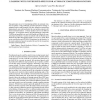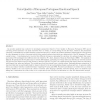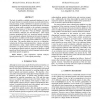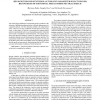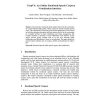107
click to vote
INTERSPEECH
2010
14 years 9 months ago
2010
This paper presents an analysis of phoneme durations of emotional speech in two languages: Dutch and Korean. The analyzed corpus of emotional speech has been specifically develope...
178
Voted
CAINE
2010
15 years 5 days ago
2010
The ability for humans to understand and process the emotional content of speech is unsurpassed by simulated intelligent agents. Beyond the linguistic content of speech are the un...
135
click to vote
ICASSP
2010
IEEE
15 years 2 months ago
2010
IEEE
Data sparseness is an ever dominating problem in automatic emotion recognition. Using artificially generated speech for training or adapting models could potentially ease this: t...
106
click to vote
ICASSP
2010
IEEE
15 years 2 months ago
2010
IEEE
This study explores manifold representations of emotionally modulated speech. The manifolds are derived in the articulatory space and two acoustic spaces (MFB and MFCC) using isom...
119
click to vote
PCM
2001
Springer
15 years 6 months ago
2001
Springer
The paper describes an experimental study on the detection of emotion from speech. As computer based characters such as avatars and virtual chat faces become more common, the use ...
155
click to vote
PROPOR
2010
Springer
15 years 7 months ago
2010
Springer
An acoustic analysis was conducted to investigate parameters related to Voice Quality in European Portuguese (EP) speech conveying several emotions. Our main objectives were: to o...
160
click to vote
ADS
2004
Springer
15 years 7 months ago
2004
Springer
This paper describes an initial approach to emotional speech synthesis in Catalan based on a diphone concatenation TTS system. The main goal of this work is to develop a simple pro...
124
click to vote
ICMCS
2008
IEEE
15 years 8 months ago
2008
IEEE
The lack of publicly available annotated databases is one of the major barriers to research advances on emotional information processing. In this contribution we present a recentl...
113
click to vote
ICASSP
2008
IEEE
15 years 8 months ago
2008
IEEE
One of the biggest challenges in emotional speech resynthesis is the selection of modification parameters that will make humans perceive a targeted emotion. The best selection me...
109
click to vote
SAMT
2009
Springer
15 years 8 months ago
2009
Springer
Our research in emotional speech analysis has led to the construction of several dedicated high quality, online corpora of natural emotional speech assets. The requirements for que...

